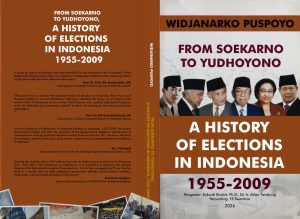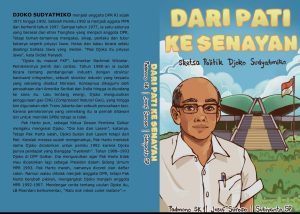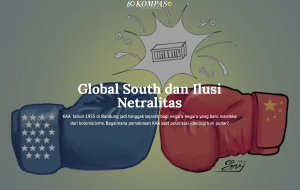In the run-up to Indonesia’s 2024 presidential elections, the political landscape is rife with strategies to captivate the electorate, particularly Generation Z. Among these is the ‘gemoy’ image of Prabowo Subianto, a term connoting cuteness and amiability, and the seemingly passive stance of his vice-presidential candidate, Gibran Rakabuming Raka. While these tactics might seem benign or appealing, a deeper analysis reveals them as emblematic of a political culture that treats democratic elections as mere spectacles, undermining the substantive engagement necessary for a healthy democracy.
The ‘Gemoy’ Gimmick: More Than Just Harmless Fun
The term ‘gemoy,’ often used to describe something adorable or endearing, has been co-opted by the Prabowo camp in a calculated move to soften the image of a candidate otherwise known for his stern, military background. This strategy, while seemingly innocuous, needs to be revised. It represents a troubling shift in political discourse from policy and capability to personality and charm. The danger here is twofold: it trivializes the gravitas required of a national leader and manipulates a young, impressionable electorate.
Generation Z, a significant demographic in the upcoming elections, is particularly vulnerable to such tactics. Accustomed to the fast-paced, image-driven culture of social media, there is a risk that they might equate ‘gemoy’ with suitability for leadership. This is a dangerous conflation. Leadership, especially at the presidential level, demands more than likability—it requires a deep understanding of complex national issues, a vision for the country’s future, and the ability to make tough decisions. Therefore, the ‘gemoy’ image is a superficial veneer, distracting from the substantive evaluation of a candidate’s policies and track record.
Gibran’s Silence: A Missed Opportunity for Democratic Engagement
Meanwhile, Prabowo’s vice-presidential candidate, Gibran Rakabuming Raka, exacerbates the issue with his approach to the media and public discourse. Gibran’s passive avoidance of media questions, echoing a strategy that could be perceived as a cover-up for his problematic candidacy, mirrors the tactics employed by his father, President Joko Widodo. This similarity is particularly noticeable in how both have shirked responsibility when faced with journalistic inquiries about controversial decisions, such as the Constitutional Court’s and New Capital City (IKN) ruling that facilitated Gibran’s vice-presidential path and the dynamics of his candidacy within Prabowo’s coalition party.
His reluctance to engage in discussions and generic responses to media queries represent a missed opportunity for democratic engagement. Gibran’s stance—characterized by phrases like “just live,” “don’t need to respond,” and “we accept all input” –is not just passivity; it’s a strategic withdrawal from the critical dialogues that shape a democracy.
In avoiding discussions and being unresponsive to public and media inquiries, Gibran and his team fail to fulfill a crucial democratic duty. A vice-presidential candidate should be at the forefront of policy debates, articulating their vision and responding to public concerns. This reluctance, whether intentional or not, creates a vacuum in which substantive political discourse should exist. It suggests a political elite detached from the electorate they seek to serve, undermining the essence of democratic elections, which are meant to be a marketplace of ideas, not a parade of personalities.
The Consequences of Spectacle over Substance
The trend towards spectacle over substance in Indonesian politics is not just a theoretical concern—it has real-world implications. When elections become more about image and less about issues, it leads to an ill-equipped governance to tackle the nation’s challenges. Policies become secondary to public relations, and the real needs of the people are sidelined in favor of maintaining a likable persona.
This approach also sets a dangerous precedent for future elections. If ‘gemoy’ and avoidance become successful strategies, they will likely be emulated, leading to a political environment where depth and detail are sacrificed for charm and charisma. This could result in a generation of leaders who are popular but ineffective and charismatic but need to be more knowledgeable about the nuances of governance.
The Need for a Reinvigorated Political Discourse
To counter this trend, there is a need for a reinvigorated political discourse in Indonesia. The media, civil society, and the electorate must demand more from their candidates. This means pushing for debates on policy issues, holding candidates accountable for their statements and promises, and critically assessing their track records. It also means educating the electorate, particularly young voters, about the importance of substantive issues over superficial charm.
Candidates themselves have a responsibility to elevate the level of discourse. They must resist the temptation to reduce their campaigns to mere image management and instead engage in meaningful dialogues about the country’s future. They should be willing to discuss their policies in detail, respond to criticisms, and articulate a clear vision for Indonesia.
Engaging Gen Z: Beyond the ‘Gemoy’ Illusion
The challenge becomes even more pronounced when engaging with Generation Z. This demographic, poised to play a pivotal role in the upcoming elections, is often stereotyped as being more concerned with digital trends and viral content than severe political issues. However, this is a superficial and unfair characterization. Gen Z, like any other group, has the potential to engage deeply with political issues, provided they are given the right opportunities and resources. The onus is on the political candidates and the media to provide these opportunities, elevate the discourse, and engage with this demographic meaningfully.
Merely catering to perceived surface-level interests with ‘gemoy’ gimmicks is more than just patronizing; it is a missed opportunity to harness young voters’ energy, creativity, and unique perspectives (https://www.bloombergtechnoz.com/detail-news/21981/gimik-gemoy-jarang-adu-gagasan-prabowo-gibran-pede-menang). Gen Z should be approached as informed citizens capable of understanding and contributing to complex political discussions, not just as a demographic to be wooed with charisma and charm.
The Role of Media and Civil Society
The media and civil society organizations are crucial in shaping political discourse. They can mediate between the candidates and the electorate, ensuring the political conversation remains grounded in substantive issues. By organizing debates, interviews, and discussions that focus on policy rather than personality, they can help steer the narrative toward more meaningful engagement.
Civil society organizations, in particular, can help bridge the gap between political candidates and the electorate, especially the youth. Through educational programs, workshops, and forums, they can empower voters with the information and tools needed to make informed decisions. This is crucial in a political environment where the allure of personality can often overshadow the importance of policy.
The Responsibility of the Electorate
The electorate, too, bears responsibility for the quality of their democracy. Voters must demand more from their candidates, scrutinizing their policies, track records, and the feasibility of their promises. This requires engagement beyond what is often seen in personality-driven campaigns. It calls for voters to be proactive, to educate themselves about the issues at stake, and to participate actively in the democratic process.
Young voters, in particular, need to be aware of the power they wield. They must use this power wisely, not swayed by charisma alone but by a candidate’s competence and commitment to addressing the issues that matter to them. By doing so, they can ensure that their interests are adequately represented and that the leaders they elect are genuinely capable of steering the nation towards progress.
The ‘gemoy’ image of Prabowo and Gibran’s silence represents a worrying shift in Indonesian political discourse, where charm is prioritized over substantive policy. This trend undermines the democratic process and disservice voters, particularly the youth, who must look beyond these superficialities to evaluate policies and leadership qualities critically. Candidates must engage transparently with their constituents, sharing clear visions for the nation’s future, while the media and civil society should guide political discussions to focus on substantial issues. The 2024 elections in Indonesia present a critical opportunity to move towards a more informed, policy-centric electoral culture, reinforcing the true essence of democracy as a reflection of the people’s collective aspirations and needs rather than a mere showcase of charismatic or adorable personalities.





